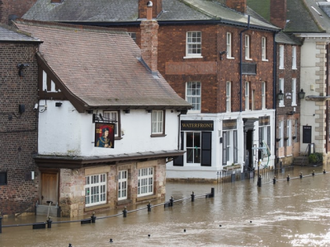How will humans cope with a serious rise in sea-levels this century?

Heavy floods drench historic houses in York 2020 - Photo by Don Lodge on Unsplash
Fr Sean McDonagh, SSC writes:
For the past two and a half centuries, humans, beginning in Europe and the United States and later globally, have burned fossil fuels to heat their homes and travel by train, cars, and planes. Looking at the commitments made by politicians at COP26 on climate change in Glasgow in November 2021, the average global temperature is expected to rise by between 2.7 to 3 degrees Celsius during the next 30 years. This would be a disaster for the oceans and all life on earth. As the oceans become warmer, icecaps in the Arctic, Antarctica, Greenland, the Himalayas, the Andes, and the Alps will melt.
As a result, many scientists fear that the Thwaites Glacier, a Florida-sized glacier in the Antarctic will collapse and release massive amounts of ice and water into the southern oceans. This would lead to a 65 centimetre rise in sea-levels by 2050 which would be an unimaginable disaster for the planet. Researchers warn that the glacier could begin to break up within the next three to five years. This would mean destabilising more and more icesheets on Antarctic itself. If the Western Antarctic icesheet were to melt, this would add as much as 3.6 metres to the level of the ocean over a few centuries.
The oceanographer, Stefam Rahmstorfat at the University of Potsdam, Germany, points out that there are more than 150 seaside cities with populations of more than a million residents situated around the world. Cities such as Jakarta, Manila, Rio De Janeiro, and Miami would be flooded. In the Maldives, in the Indian Ocean, half a million people live a metre above the sea-level. Scientists now believe that in a worst-case scenario, sea levels could rise by 2.5 metres in the 21st century. The former president of the Maldives, Mohamed Nasheed, pleaded with global politicians attending COP26 not to compromise on the 1.5-degree Celsius rise above pre-industrial levels. He told the media that we cannot sign a suicide pack.
Sea levels in Florida have risen by about one inch per decade. Scientists predict that the southern third of Florida could be underwater by the year 2,100. Across the globe in Bangladesh, the country could lose 11 percent of its land by 2050, affecting an estimated 15 million people.
But Europe is also vulnerable. The non-profit organisation Climate Central reminds us that Britain will be one of the country's most affected by rising sea levels. In London, for example, rising sea levels could cause the Thames to flood and submerge vast areas of the capital.
Neither will Ireland be spared. In Dublin special maps have been made to explore sea level rise and coastal flood threats. Howth could become an island and places like Fairview, Clontarf, Sandymount, Malahide, Portmarnock and the Aviva Stadium could be seriously affected by flooding in the decades ahead. Research by the Hamilton Institute and ICARUS Climate Research Centre in Maynooth University have created an updated sea level dataset which covers the period from `1938 until 2016. This shows that the sea level rise in Cork and Dublin is now happening at twice the global rate. The study also shows that in Cork sea-levels have risen by 40cm.
Cork, Ireland's largest county, will be affected by rising tides, in areas such as Cobh and Youghal. In recent years, Climate Central have been releasing maps which show the effects of a 2mm to 4mm rise in sea level by 2050. Houses in the city will be flooded regularly and the brunt of the damage will in Marina Market, University College Cork and Páirc Ui Chaoimh
In Donegal, Letterkenny is expected to lose landmass to the oceans. The seaside town of Bundoran, one of Ireland's chief surfing spots, could also be flooded. In the August 2017, the Inishowen peninsula in Donegal received a month's rainfall in one day. This caused serious, life-threatening foods as rivers rose dramatically, flooding many houses and making roads impassable. Five years later, some of these houses are still severely damaged and considered to be uninsurable. The floods washed away bridges which were 200 years old. Brendan O'Donnell, a senior engineer with Donegal County Council, is convinced that, because of climate changes, these kinds of severe weather incidents will happen, not every 50 years, but every decade. This means we must put aside a lot of resources to deal with sea-level rise. O'Donnell warns that the cost of building piers and harbours as sea levels rise will be enormous.
Gamma maps for County Clare estimate that 7,376 homes and 1,320 business will be at risk of flooding. In Limerick, 1,741 houses and 685 businesses are in danger. It is becoming increasingly clear that flooding from sea-level rise is affecting every coastal country in Ireland.
In 2020 and 2021 we learned a lot about how severe weather caused wildfires, droughts and floods affecting many people around the world. But we also need to take sea-levels rise more seriously and avoid it as much as possible. Above all we must not follow the advice of populist politicians such as Democratic Senator from West Virginia, Joe Manchin, former US President Trump or Boris Johnson in the UK who seem more focused on protecting the fossil fuel industry than in protecting the planet.
Tackling climate change will not be easy, anywhere, but especially in Ireland. Methane generated by dairy farming make up 35 percent of Ireland's greenhouse gasses. Given the strength of the dairy lobby in Ireland, getting farmers to cut their herds deeply will not be easy. Secondly, in May 2022, the Central Statistics Office (CSO) show that data centres in Ireland now consume more electricity than all rural homes combined. There has been a significant increase in data centres consuming electricity in recent years, up from 5 percent in 2015 to 14 percent in 2021. Unfortunately, the government is not committed to reducing data centres in Ireland.
And yet, the authors of the Intergovernmental Panel on Climate Change (IPCC) report published in April 2022, states that greenhouse gas emissions must peak in three years if we are to hold global warming to 1.5 degrees Celsius. It must fall by 43 percent by 2030 and 95 percent by 2050.
In response to the IPCC report, the UN General Secretary, Antonio Guterres said that "the report is a file of shame, cataloguing the empty pledges that put us firmly on track towards an unliveable world." On the positive side, the IPCC report points out that 10 countries have cut greenhouse gas emissions in the past decade and that the cost of decarbonising the economy have plummeted in the past ten years. Peter Smith, one of the authors of the IPCC report is clear that we must change dramatically the way we travel, eat, and generate energy in the next few years.
In paragraph 25 of the encyclical Laudato Si,' Pope Francis highlights the ethical issues involved in climate change and the rise in sea-level, first world countries have been emitting CO2 to the atmosphere for over 200 years, and even today they emit three times more CO2 than developing countries. The encyclical is clear that the impact of climate change will be felt in poor, developing countries and the Pope acknowledges that "many of the poor live in areas particularly affected by phenomena related to warming, and their means of subsistence are largely dependent on natural reserves and ecosystemic service such as agriculture, fishing, and forestry. They have no other financial activities or resources which can enable them to adapt to climate change or to face natural disasters and their access to and protection is very limited."
Climate change and the destruction of biodiversity are two of the most important issues of our time. We will have to make serious sacrifices in order to achieve this goal for the well-being of all future generations.


















